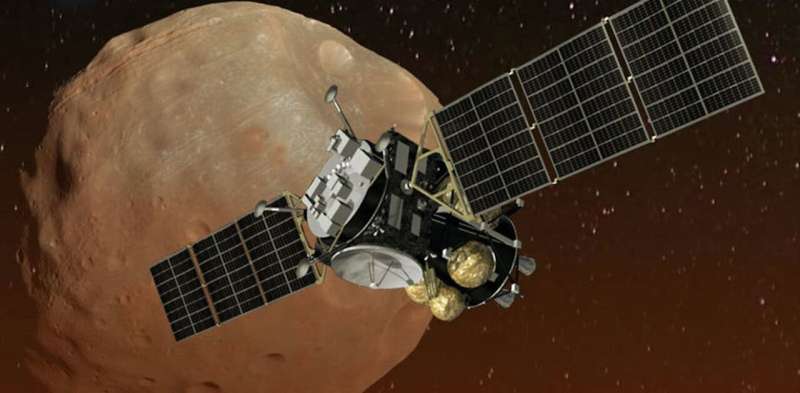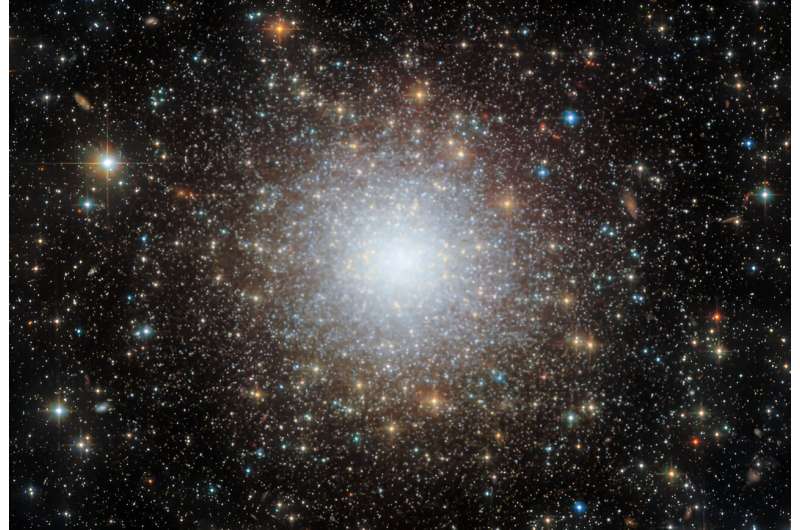How Rocks Say Don't Touch: Sols 4032-4034
Sunday, 10 December 2023 06:46 Earth planning date: Friday, December 8, 2023: As we climb through the terrain, which is beautiful to look at with its steep topography, we are on the lookout for all the differences in the rocks. As a geologist, I marvel at the diversity, and I can spend quite some time just looking around, discovering the different things that there are to see. Have a look at this workspace mosaic, which is th
Earth planning date: Friday, December 8, 2023: As we climb through the terrain, which is beautiful to look at with its steep topography, we are on the lookout for all the differences in the rocks. As a geologist, I marvel at the diversity, and I can spend quite some time just looking around, discovering the different things that there are to see. Have a look at this workspace mosaic, which is th Amateur Astronomers Help Discover Cosmic Crash
Sunday, 10 December 2023 06:46 Astronomers found what looks like a glowing cloud of dust from a massive planetary pile-up-and NASA volunteers helped make the discovery! A recent paper in Nature describes how an international group of professional and amateur astronomers teamed up to measure the heat glow of two ice giant planets colliding and see the resultant dust cloud moving in front of the parent star several years later.
Astronomers found what looks like a glowing cloud of dust from a massive planetary pile-up-and NASA volunteers helped make the discovery! A recent paper in Nature describes how an international group of professional and amateur astronomers teamed up to measure the heat glow of two ice giant planets colliding and see the resultant dust cloud moving in front of the parent star several years later. Observatory to unravel universe's mysteries
Sunday, 10 December 2023 06:46 Deep beneath a hill in the rural Kaiping area of Jiangmen, China's largest underground laboratory, the Jiangmen Underground Neutrino Observatory (JUNO), is on the verge of completing a decade-long construction project that promises to shed light on some of the universe's most enduring mysteries.
Our expedition to this clandestine scientific haven began with a 15-minute journey in a dimly l
Deep beneath a hill in the rural Kaiping area of Jiangmen, China's largest underground laboratory, the Jiangmen Underground Neutrino Observatory (JUNO), is on the verge of completing a decade-long construction project that promises to shed light on some of the universe's most enduring mysteries.
Our expedition to this clandestine scientific haven began with a 15-minute journey in a dimly l Unique CU Boulder, NSO collaboration allows journey into varied solar physics research paths
Sunday, 10 December 2023 06:46 A new group of graduate students and postdocs are hard at work this fall with full freedom to explore a variety of solar and space physics research paths because of a unique fellowship program started by the University of Colorado Boulder at the time of the relocation of the National Science Foundation's National Solar Observatory to campus.
The George Ellery Hale Fellowships, created by t
A new group of graduate students and postdocs are hard at work this fall with full freedom to explore a variety of solar and space physics research paths because of a unique fellowship program started by the University of Colorado Boulder at the time of the relocation of the National Science Foundation's National Solar Observatory to campus.
The George Ellery Hale Fellowships, created by t When is an aurora not an aurora
Sunday, 10 December 2023 06:46 The shimmering green, red and purple curtains of the northern and southern lights - the auroras - may be the best-known phenomena lighting up the nighttime sky, but the most mysterious are the mauve and white streaks called Steve and their frequent companion, a glowing green "picket fence."
First recognized in 2018 as distinct from the common auroras, Steve - a tongue-in-cheek reference to
The shimmering green, red and purple curtains of the northern and southern lights - the auroras - may be the best-known phenomena lighting up the nighttime sky, but the most mysterious are the mauve and white streaks called Steve and their frequent companion, a glowing green "picket fence."
First recognized in 2018 as distinct from the common auroras, Steve - a tongue-in-cheek reference to NASA Laser Reflecting Instruments to Help Pinpoint Earth Measurements
Sunday, 10 December 2023 06:46 The best known use of GPS satellites is to help people know their location whether driving a car, navigating a ship or plane, or trekking across remote territory. Another important, but lesser-known, use is to distribute information to other Earth-viewing satellites to help them pinpoint measurements of our planet.
NASA and several other federal agencies, including the U.S. Space Force, U.
The best known use of GPS satellites is to help people know their location whether driving a car, navigating a ship or plane, or trekking across remote territory. Another important, but lesser-known, use is to distribute information to other Earth-viewing satellites to help them pinpoint measurements of our planet.
NASA and several other federal agencies, including the U.S. Space Force, U. Ovzon 3 Satellite Launch with SpaceX Set for December 15, 2023
Sunday, 10 December 2023 06:46 Ovzon, a prominent player in mobile satellite communication, is on the cusp of a significant milestone with its latest project, Ovzon 3. This satellite, poised for launch no earlier than December 15, 2023, represents a critical advancement in the field of space technology. In partnership with SpaceX, Ovzon 3 will be launched from the historic Cape Canaveral, Florida, using the renowned Falcon 9
Ovzon, a prominent player in mobile satellite communication, is on the cusp of a significant milestone with its latest project, Ovzon 3. This satellite, poised for launch no earlier than December 15, 2023, represents a critical advancement in the field of space technology. In partnership with SpaceX, Ovzon 3 will be launched from the historic Cape Canaveral, Florida, using the renowned Falcon 9 Landspace launches third methane Zhuque-2, targets 2025 launch of new stainless steel rocket
Saturday, 09 December 2023 13:40

The longstanding mystery of Mars' moons—and the mission that could solve it
Saturday, 09 December 2023 10:10
The two small moons of Mars, Phobos (about 22km in diameter) and Deimos (about 13km in diameter), have been puzzling scientists for decades, with their origin remaining a matter of debate. Some have proposed that they may be made up of residual debris produced from a planet or large asteroid smashing into the surface of Mars (#TeamImpact).
An opposing hypothesis (#TeamCapture), however, suggests the moons are asteroids that were captured by Mars's gravitational pull and were trapped in orbit.
To solve the mystery, we'll need material from the moons' surfaces for analytical analyses on Earth. Luckily, the Japan Aerospace Exploration Agency (Jaxa) will launch a mission, named "Martian Moon eXploration" (MMX), to Phobos and Deimos in September 2024. The mission will be carried by a newly designed rocket, the H-3, which is still under development.
The spacecraft is expected to reach Martian orbit in 2025, after which it will orbit Phobos and finally collect material from its surface before returning to Earth by 2029.
This will make it the next in a series of recent missions bringing material from space back to Earth, following on from Jaxa's successful mission to asteroid Ryugu (Hayabusa2), as well as Nasa's Osiris-Rex mission to asteroid Bennu and the Chinese Space Agency's Chang'e 5 mission to the Moon.
Three satellites presumed lost in Transporter deployment malfunction
Friday, 08 December 2023 23:03

U.S. Space Force activates new unit to support operations in Europe and Africa
Friday, 08 December 2023 22:13

Experts raise concerns about U.S. commitment to GPS modernization
Friday, 08 December 2023 21:12

Image: Hubble captures a cluster in the Large Magellanic Cloud
Friday, 08 December 2023 16:34
This striking Hubble Space Telescope image shows the densely packed globular cluster known as NGC 2210, which is situated in the Large Magellanic Cloud (LMC). The LMC lies about 157,000 light-years from Earth and is a so-called satellite galaxy of the Milky Way, meaning that the two galaxies are gravitationally bound. Globular clusters are very stable, tightly bound clusters of thousands or even millions of stars. Their stability means that they can last a long time, and therefore globular clusters are often studied to investigate potentially very old stellar populations.
In fact, 2017 research using some of the data that were also used to build this image revealed that a sample of LMC globular clusters were incredibly close in age to some of the oldest stellar clusters found in the Milky Way's halo.
Northrop Grumman tests new solid rocket motor technologies
Friday, 08 December 2023 14:06




